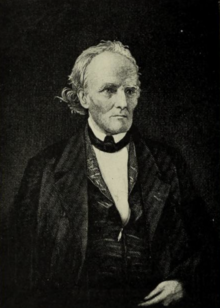Samuel Williams (April 23, 1743 – January 2, 1817) was an American minister and educator.
Samuel Williams | |
|---|---|
 | |
| 3rd Hollis Chair of Mathematicks and Natural Philosophy at Harvard University | |
| In office 1779–1789 | |
| Preceded by | John Winthrop |
| Succeeded by | Samuel Webber |
| Personal life | |
| Born | April 23, 1743 |
| Died | January 2, 1817 (aged 73) |
| Resting place | North Main Street Cemetery, Rutland, Vermont |
| Alma mater | Harvard University |
| Relatives | Rev. John Williams (grandfather) |
| Religious life | |
| Religion | Presbyterianism |
Early life and education
editBorn in Waltham, Massachusetts, Williams entered Harvard, and graduated in 1761. While at Harvard, he gained the attention of notable scientist and professor John Winhrop, whom Williams accompanied shortly before his graduation to observe the 1761 transit of Venus. He was elected as a member to the American Philosophical Society in 1772.[1] Returning to Waltham, Williams found little opportunity for further work in astronomy and began studying as a presbyterian minister.[2]
Career
editWorking as a priest in Bradford, Massachusetts, he continued his astronomic and scientific inquiries and regularly featured in the Salem newspaper. In 1780 he dedicated himself full time to scientific pursuits, trading his pastorate in Bradford for a post as Professor of Mathematics and Natural Philosophy at Harvard. His teaching was commemorated by the likes of John Quincy Adams, a pupil of his, and his papers were published by the APS and American Academy of Arts and Sciences.[3]
Like many of his contemporaries, his writing and lectures spanned various fields and topics, ranging from astronomy, heat, electricity, air, magnetism, earthquakes, eclipses, and weather phenomenon. He earned honorary LL.D. degrees from Yale and Edinburgh, and election to the Meteorological Society of Manheim. Despite such high honors, Williams’ career came crashing down when he was accused of mishandling funds, spending too much money on his wife, and worst of all, forgery. This caused him to leave Harvard in 1788, and, now an outcast, he resigned to the village of Rutland in Vermont. He took up priestly duties once again, only returning to academia to give lectures at the University of Vermont. Meanwhile, he also founded and edited the Rutland Herald, continued his activity with the APS, published his sermons, and documented the landscape and history of Vermont.[4][3]
Death
editHe died of a brief illness in his home in Rutland, Vermont. He is buried at the North Main Street Cemetery.[5]
References
edit- ^ "APS Member History". search.amphilsoc.org. Retrieved 2021-07-12.
- ^ "Collection: Papers of Samuel Williams | HOLLIS for". hollisarchives.lib.harvard.edu. Retrieved 2021-07-12.
- ^ a b Curti, Merle; Tillman, William; Williams, Samuel (1970). "Philosophical Lectures by Samuel Williams, LL. D., on the Constitution, Duty, and Religion of Man". Transactions of the American Philosophical Society. 60 (3): 1–130. doi:10.2307/1005975. ISSN 0065-9746. JSTOR 1005975.
- ^ "Collection: Papers of Samuel Williams | HOLLIS for". hollisarchives.lib.harvard.edu. Retrieved 2021-07-12.
- ^ "Rev Samuel Williams (1743-1817) - Find A Grave..." www.findagrave.com. Retrieved 2021-07-12.